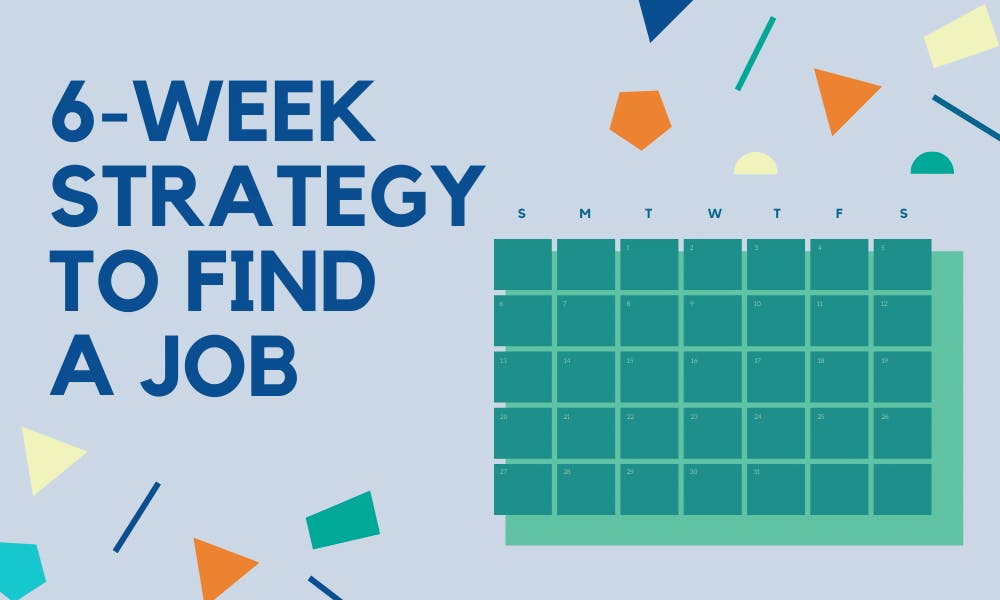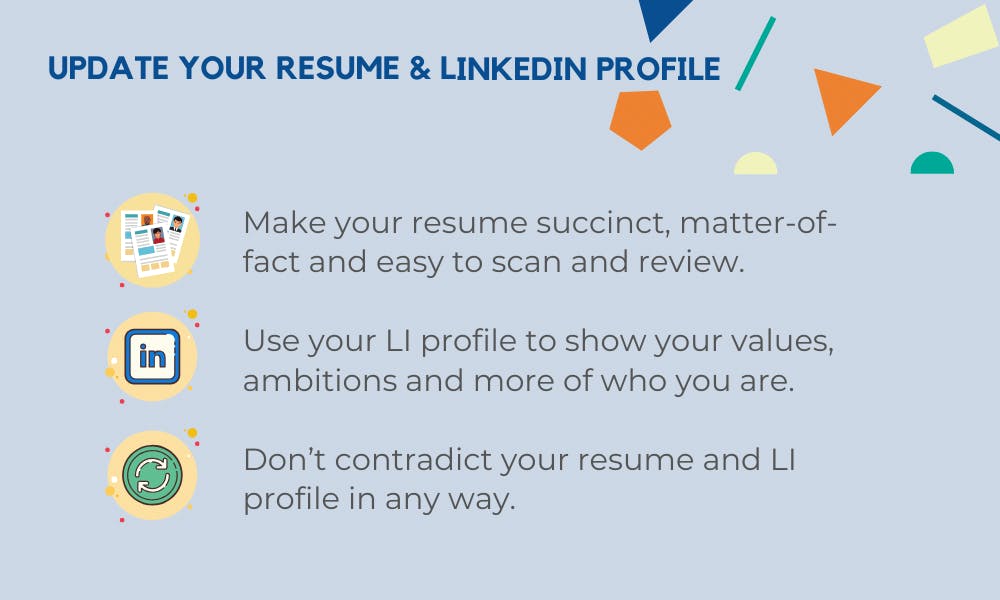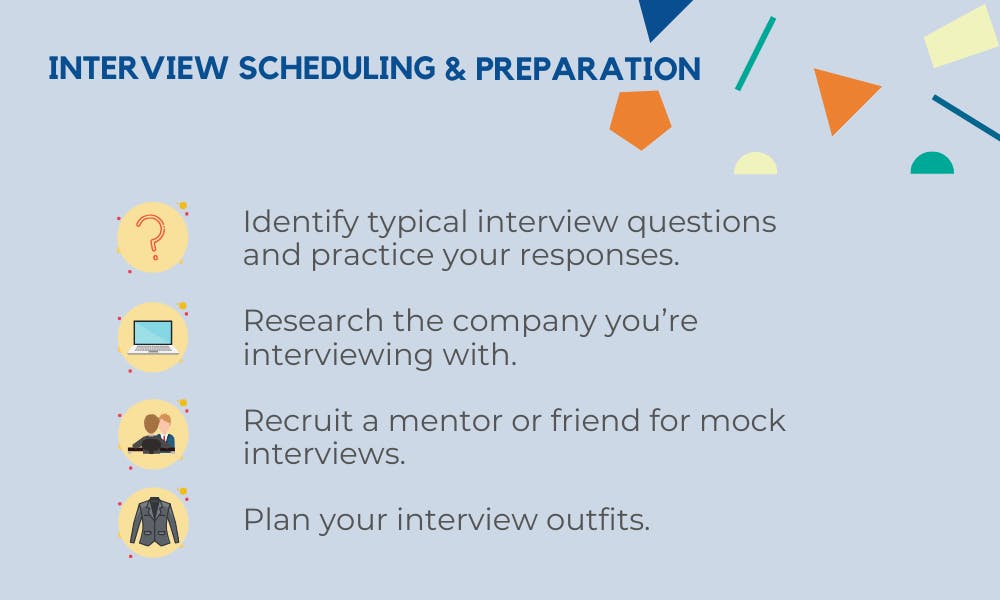
Some job search timelines are more urgent than others. Maybe you’ve been let go, or you see the writing on the wall, or you’re done dealing with a difficult work environment, or your life situation is changing.
Maybe you just work better under a deadline!
Whatever the reason, and even if you’re not under pressure but you’re ready to make a career change, I’ve boiled down the job search into a 6-week plan with tips for every week. Included with each week is a link to a helpful article I found on that week’s assignment.
Some weeks can overlap, and some steps will take more time, but this is a good roadmap. This approach will help you get on track, avoid dead ends and relieve some of the stress and anxiety of finding a new job.
Week 1: Establish your job goals
You may view this as an extraneous and unnecessary step, but it’s actually very important for a successful job search. Simply stating “I want a new job” is too vague. And vague search criteria lead to vague results, dead ends, wasted time and greater frustration and anxiety.
Put yourself in a quiet place and do some thinking and imagining about your ideal job. Start by identifying anything you do NOT want in your next job!
Then start asking questions to identify what you do want:
- What type of position, work and responsibilities would suit you best?
- What sector interests you—law, business, government, academic, science, nonprofit?
- What are your core values and ideal work environment?
- How about location? Consider commuting, urban or downtown setting versus something more remote, working remotely from home, willingness to relocate and anything else.
As you answer these and any other questions, it’s important that you do so with an honest evaluation of your work history in mind. Identify not only your experience, but your underlying training and skills including soft skills like communication or time management. Identify what you are capable of doing and how you could demonstrate that if you have little or no experience to back it up.
While this step takes time, it also saves time in the long run. Plus, the more targeted you are, the easier it will be to develop and implement the right plan.
- How to Create an Effective Job-Search Plan (from Top Resume)
Week 2: Update your resume & LinkedIn profile
When you’re clear on what you’re looking for and have a full, honest assessment of your relevant skills and experience, it’s time to refine your resume and LinkedIn (LI) profile to match your goals and highlight the qualifications that will help you reach them. Create a cover letter template and revisit your other social media profiles. Since potential employers and recruiters are likely to do this, you should do a search on your name to see what they will see. (This article I wrote last year on social media oversharing may be helpful.)
Your resume and LI profile should complement each other:
- Make the resume succinct and matter-of-fact, and most importantly, make sure it’s formatted for easy scanning and review.
- Use your LI profile to share more information that shows your values, ambitions and more of who you are. Write and post articles related to your work and your audience, join groups, add skills and ask a few people in your network who know you well if they would give you a recommendation.
- Make sure they don’t contradict each other in any way, which could raise unwanted and unnecessary red flags.

If you were going to run a marathon, you would need to invest in good sneakers—consider this week your opportunity to get the fundamentals of your job search marathon ready to go.
- This Is What Your Resume Should Look Like in 2020 (from The Muse)
- 19 Essential LinkedIn Profile Tips for Job Seekers (from Find My Profession)
Week 3: Reach out to your network
Often the best jobs are the ones we find through our own networks. Now that you’ve laid a good foundation, you can feel confident directing people to your LI profile or sending them your resume. It’s time to talk to colleagues, peers and friends who work in your industry. Also start researching and attending conferences or events in your area or that you can travel to.
At the same time, create your “elevator pitch” so you can describe who you are and the value you deliver. This will help you go to events confidently and prepared. And supplement in-person networking with online networking. Don’t be afraid to reach out individually to your LinkedIn network.
- Best Elevator Pitch With Examples For Job Seekers (from Career Sidekick)
Week 4: Apply to job openings
You can start applying for jobs in week 3, but make the application process your focus during week 4. Spend a set amount of time each day searching for and applying to jobs that look like a good fit.
While it’s okay to stretch and aim high, it’s better to apply to positions that are a close match to your experience and skills, especially online.
The big job search boards like Indeed and Monster will have the most listings, but you’ll also face the most competition. Niche job sites for library and information professionals are more focused, plus they give you an idea of skills that are in demand.
Week 5: Interview scheduling and preparation
The goal is to get as many suitable interviews as possible, even if the position doesn’t hit all your criteria for your ideal job. Practice makes perfect, and especially if you’re early in your career, every job can be a stepping stone in the right direction.
- Identify typical interview questions (links on that to come) and practice your responses to them. You don’t want to come across being artificial and scripted, but preparation will boost your confidence and impress the interviewer.
- Preparation includes researching the company or organization you’re interviewing with and learning as much as possible about them.
- Recruit a mentor or friend for mock interviews in-person, over the phone, and online via Skype, Zoom or Google Hangouts to cover all bases and get more practice.
- Plan your interview outfits, including bags. Even if you know the organization has a casual dress policy, it’s still best to dress in a suit or coordinated separates to show you take this opportunity seriously.

- Commonly Asked Library Interview Questions (from Mr. Library Dude blog)
- Smart Answers to the 21 Most Common Interview Questions (from Job-Hunt)
Week 6: Follow-up, rinse and repeat
At this point and moving forward, you will be networking, applying and interviewing interchangeably. My advice at this point:
- Follow-up every interview and networking opportunity with a thank you and confirmation of your interest in the opportunity.
- Be prepared for an offer, which means preparing to negotiate salary or anything else that matters to you.
- Also be prepared for rejection, and don’t take it personally.
If you’re still not landing interviews or job offers after these steps, revisit each one to figure out where you can make improvements. For example:
- Not getting interviews? Revise your resume.
- Not getting offers after the interview? Work on your interview skills.
Finally, if you’re in a dire situation, consider temping or a part-time job while you continue your search. And stay positive, no matter how many weeks it takes.
- This plan can help you land a new job in 8 weeks flat (some of what I’ve covered and more from Monster)
